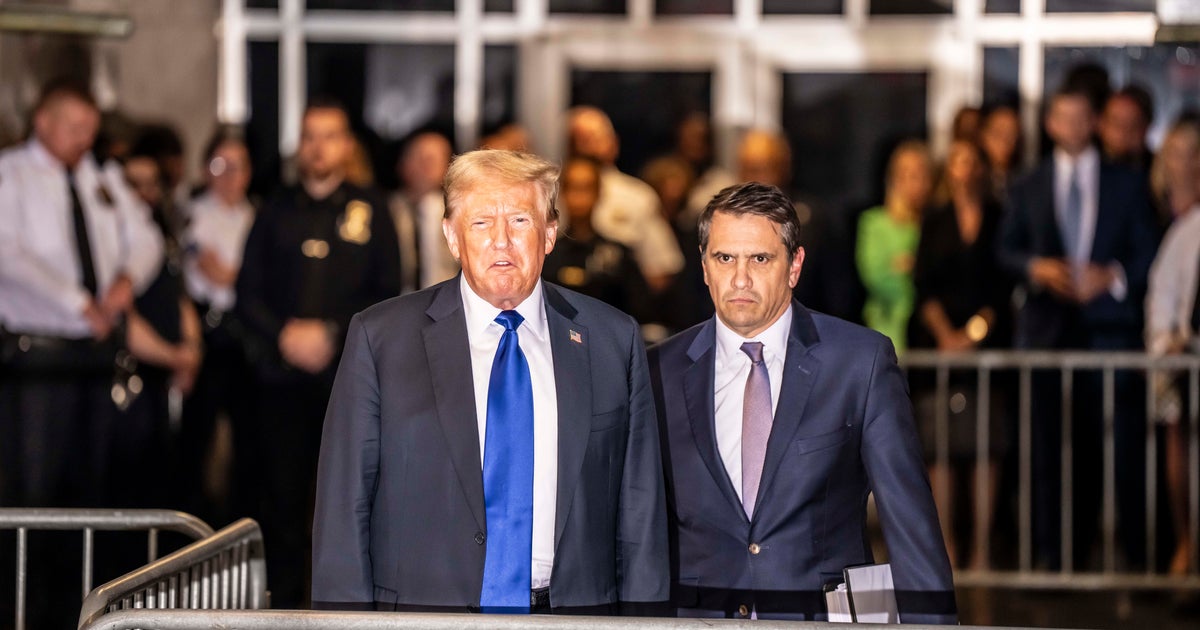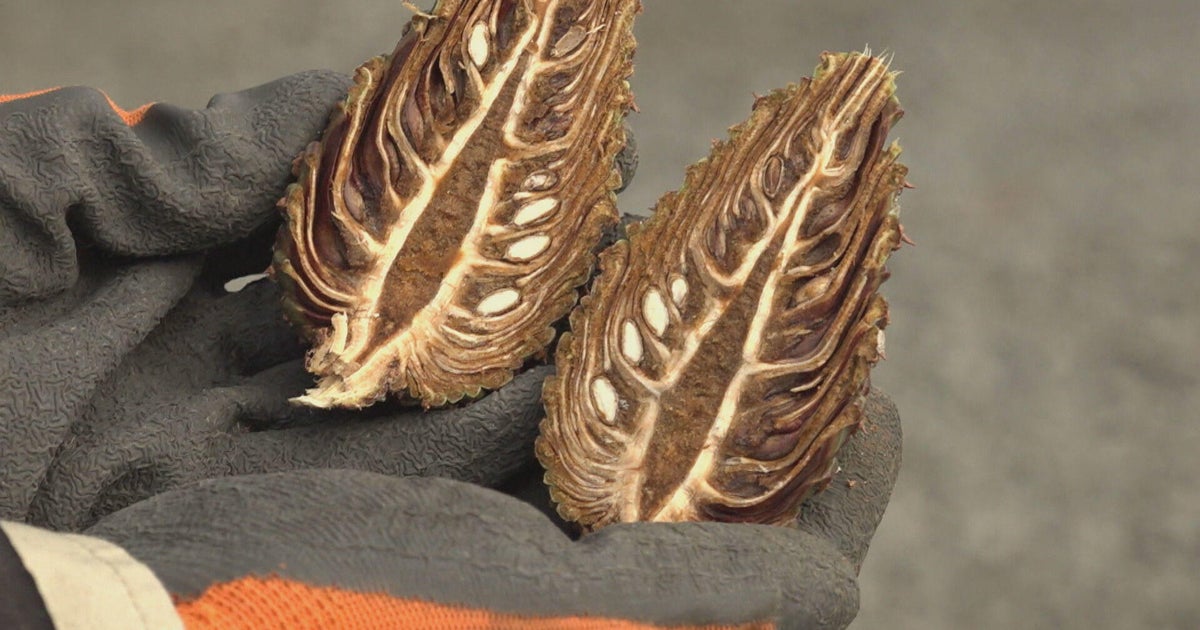Fired director of U.S. cyber agency Chris Krebs explains why President Trump's claims of election interference are false
Though the transition has begun, President Trump remains largely holed up in the White House tweeting false accusations of a rigged election from behind a crumbling wall of lawsuits. No legal challenge, no recount, no audit has changed the outcome in any state. Mr. Trump's claim that millions of votes were deleted or switched is denied by the official he chose to secure the nation's election systems. Christopher Krebs called the 2020 vote "the most secure in American history" which promptly got him fired. Tonight, in his first interview since he was dismissed, Krebs tells us why he believes the vote was accurate and why saying otherwise puts the country in danger.
Chris Krebs: I have confidence in the security of this election because I know the work that we've done for four years in support of our state and local partners. I know the work that the intelligence community has done, the Department of Defense has done, that the FBI has done, that my team has done. I know that these systems are more secure. I know based on what we have seen that any attacks on the election were not successful.
Two years ago, President Trump put Christopher Krebs in charge of the new Cybersecurity and Infrastructure Security Agency. Krebs, a lifelong Republican, was confirmed unanimously by the Senate.
His agency, known by its acronym, "CISA" helps secure computer systems anywhere that a security breach could be catastrophic, nuclear power plants for example, and the election hardware in all 50 states.
Scott Pelley: Why are you speaking to us?
Chris Krebs: I'm not a public servant anymore, but I feel I still got some public service left in me. And, you know, it's hard once you take that oath to uphold and defend the constitution from threats foreign and domestic, it's hard to walk away from that. And if I can reinforce or confirm for one person that the vote was secure, the election was secure, then I feel like I've done my job.
Krebs, who's 43, worked on cybersecurity in the Bush administration, became director of cybersecurity policy at Microsoft and joined the Trump Department of Homeland Security in 2017. His priority was to stop anyone from repeating Russia's 2016 election hacking and disinformation.
Chris Krebs: So we spent something on the order of three and a half years of gaming out every possible scenario for how a foreign actor could interfere with an election. Countless, countless scenarios.
Scott Pelley: So back in 2017, as you're looking ahead to the election in 2018 and then ultimately the election in 2020, you have a to-do list. And the to-do list includes what?
Chris Krebs: Paper ballots. Paper ballots give you the ability to audit, to go back and check the tape and make sure that you got the count right. And that's really one of the keys to success for a secure 2020 election. 95% of the ballots cast in the 2020 election had a paper record associated with it. Compared to 2016, about 82%.
Scott Pelley: And with a paper record, you can go back and verify what the machine is saying by physically counting the paper?
Chris Krebs: That gives you the ability to prove that there was no malicious algorithm or hacked software that adjusted the tally of the vote, and just look at what happened in Georgia. Georgia has machines that tabulate the vote. They then held a hand recount and the outcome was consistent with the machine vote.
Scott Pelley: And that tells you what?
Chris Krebs: That tells you that there was no manipulation of the vote on the machine count side. And so that pretty thoroughly, in my opinion, debunks some of these sensational claims out there-- that I've called nonsense and a hoax, that there is some hacking of these election vendors and their software and their systems across the country. It's-- it's just-- it's nonsense.
Before the election, as the president called mail-in ballots a fraud, Krebs' team released a report highlighting the safeguards built into mail-in voting. His agency knocked down rumors and exposed an Iranian plot to intimidate voters. On Election Day, Krebs assembled a team in his command center to defend the vote.
Chris Krebs: We had the Department of Defense Cyber Command. We had the National Security Agency. We had the FBI. We had the Secret Service. We also had representatives from the Election Assistance Commission, which is the federal independent agency that supports the actual administration of elections. We had representatives from some of the-- vendors, the election equipment vendors. And they're critical because they're the ones out there that know what's going on on the ground if there's any sort of issue with some of their systems. And we had representatives from state and local governments.
Scott Pelley: How did the day go?
Chris Krebs: It was quiet. And there was no indication or evidence that there was any sort of hacking or compromise of election systems on, before or after November 3rd.
And yet, this was the president, November 5.
President Trump on November 5: And this is a case where they're trying to steal an election, they're trying to rig an election.
Nine days after Election Day, Mr. Trump tweeted falsely that machines from Dominion Voting Systems deleted millions of votes. Krebs couldn't remain silent. His agency and its election security partners answered with a public statement.
Scott Pelley: To quote from the November 12th statement that CISA and its partners put out, "The November 3rd election was the most secure in American history. There is no evidence that any voting system deleted or lost votes or changed votes or was in any way compromised."
Chris Krebs: Yeah, I stand by that.
Scott Pelley: The president tweeted after that statement, quote, "The recent statement by Chris Krebs on the security of the 2020 election was highly inaccurate, in that there were massive improprieties and fraud." Do you remember what the president said at the end of that tweet?
Chris Krebs: Oh, I was terminated? Is that-- yes. I recall that.
Scott Pelley: Were you surprised?
Chris Krebs: I don't know if I was necessarily surprised. It's not how I wanted to go out. I think I-- the thing that upsets me the most about that is I didn't get a s-- chance-- to say goodbye to my team. And I'd worked with them for three and a half years, in the trenches. Building an agency, putting CISA on the national stage. And I love that team. And I didn't get a chance to say goodbye, so that's what I'm most upset about.
Since he was fired, about a dozen Republican senators have vouched for Krebs' work.
Scott Pelley: The president's essentially saying in that tweet that you did a lousy job, that you and your team blew it, and allowed massive fraud, all across the country.
Chris Krebs: We did a good job. We did it right. I'd do it a thousand times over.
Still, the president's lawyers have filed at least a dozen suits and spun conjecture without evidence.
Rudy Giuliani on November 19: And you should be more astounded by the fact that our votes are counted in Germany and in Spain...
Scott Pelley: As you watched Rudy Giuliani's news conference at the Republican National Committee headquarters, what were you thinking?
Chris Krebs: It was upsetting because what I saw was a apparent attempt to undermine confidence in the election, to confuse people, to scare people. It's not me, it's not just CISA. It's the tens of thousands of election workers out there that had been working nonstop, 18-hour days, for months. They're getting death threats for trying to carry out one of our core democratic institutions, an election. And that was, again, to me, a press conference that I just-- it didn't make sense. What it was actively doing was undermining democracy. And that's dangerous.
Scott Pelley: Let me ask for your reaction to some of the vote fraud that the president and his team have been alleging. Votes tabulated in foreign countries.
Chris Krebs: So all votes in the United States of America are counted in the United States of America. I don't-- I don't understand this claim. All votes in the United States of America are counted in the United States of America. Period.
Scott Pelley: Voting machines corrupted by mysterious actors in Venezuela.
Chris Krebs: So again, there's no evidence that any machine that I'm aware of has been manipulated by a foreign power. Period.
Scott Pelley: Communist money from China and Cuba used to influence the election.
Chris Krebs: Look, I think these-- we can go on and on with all the farcical claims that-- alleging-- interference in the 2020 election, but the proof is in the ballots. The recounts are consistent with the initial count, and to me, that's further evidence, that's confirmation that the systems used in the 2020 election performed as expected, and the American people should have 100% confidence in their vote.
Scott Pelley: In a news conference a lawyer who was representing the president at the time, Sidney Powell, said specifically that the Dominion Company's voting machines, quote…
Sidney Powell on November 19: It can set and run an algorithm that probably ran all over the country to take a certain percentage of votes from President Trump and flip them to President Biden.
Chris Krebs: Votes were cast in Georgia, for instance, again, on paper. They were counted by a machine. They were subsequently recounted by hand. The outcomes of that count were consistent. If there was an algorithm that was flipping votes or changing votes, it didn't work. I think the more likely explanation, though, is that there is no algorithm, that the systems performed as intended. That the series of security controls before, during, and after an election protected those systems from any sort of misbehavior.
Most elections are run by each state's secretary of state. But not one of them, Democrat or Republican has reported ballot rigging that would change the election. Some are paying a price for integrity.
Chris Krebs: And it's, in my view, a travesty what's happening right now with all these death threats to election officials, to secretaries of state. I want everybody to look at Secretary Boockvar in Pennsylvania, Secretary Benson in Michigan, Secretary Cegavske in Nevada, Secretary Hobbs in Arizona. All strong women that are standing up, that are under attack from all sides, and they're defending democracy. They're doin' their jobs. Look at-- look at Secretary Raffensperger in Georgia, lifelong Republican. He put country before party in his holding a free and fair election in that state. There are some real heroes out there. There are some real patriots.
At the Capitol, the stage is going up for Inauguration Day, January 20. Well before that, on December 14 the presidential electors will cast their ballots—which should settle the election. Christopher Krebs told us it's ironic that the disruption and disinformation he feared from abroad came, instead, from Pennsylvania Avenue.
Scott Pelley: The president says you're dead wrong about election security, and to him you say what?
Chris Krebs: There is no foreign power that is flipping votes. There's no domestic actor flipping votes. I did it right. We did it right. This was a secure election.
Produced by Rachael Morehouse. Associate producers, Jacqueline Kalil and Cassidy McDonald. Broadcast associates, Ian Flickinger and Sheena Samu. Edited by Sean Kelly.







